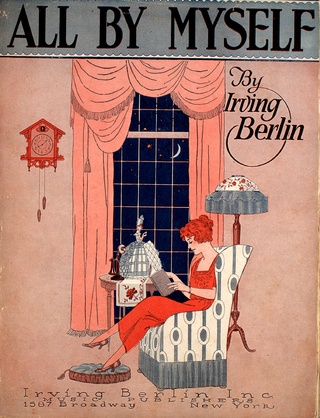Sisters is a popular song written by Irving Berlin in 1954, best known from the 1954 film White Christmas.
"All Alone" is a popular waltz ballad composed by Irving Berlin in 1924. It was interpolated into the Broadway show The Music Box Revue of 1924 where it was sung by Grace Moore and Oscar Shaw. Moore sat at one end of the stage under a tightly focused spotlight, singing it into a telephone, while Oscar Shaw sat at the other, doing the same.
"Heat Wave" is a popular song written by Irving Berlin for the 1933 musical As Thousands Cheer, and introduced in the show by Ethel Waters.
"I Want to Be Happy" is a song with music by Vincent Youmans and lyrics by Irving Caesar written for the 1925 musical No, No, Nanette.
"This Can't Be Love" is a show tune and a popular song from the 1938 Rodgers and Hart musical The Boys from Syracuse when it was sung by Eddie Albert and Marcy Westcott. The lyrics poke fun at the common depiction of love in popular songs as a host of malignant symptoms, saying, "This can't be love because I feel so well."
"They Say It's Wonderful" is a popular song written by Irving Berlin for the musical Annie Get Your Gun (1946), where it was introduced by Ethel Merman and Ray Middleton. A film version in 1950 again featured the song when it was performed by Howard Keel and Betty Hutton.
"It's Easy to Remember " is a popular song written by Richard Rodgers with lyrics by Lorenz Hart.
"I've Got a Crush on You" is a song composed by George Gershwin, with lyrics by Ira Gershwin. It is unique among Gershwin compositions in that it was used for two different Broadway productions: Treasure Girl (1928), when it was introduced by Clifton Webb and Mary Hay, and Strike Up the Band (1930), when it was sung by Doris Carson and Gordon Smith. It was later included in the tribute musical Nice Work If You Can Get It (2012), in which it was sung by Jennifer Laura Thompson. When covered by Frank Sinatra he was a part of Columbia Records.
"Witchcraft" is a popular song from 1957 composed by Cy Coleman with lyrics by Carolyn Leigh.
"Change Partners" is a popular song written by Irving Berlin for the 1938 film Carefree, in which it was introduced by Fred Astaire. The song was nominated for an Academy Award for Best Original Song in 1938, but lost out to "Thanks for the Memory."
"Isn't This a Lovely Day?" is a popular song written by Irving Berlin for the 1935 film Top Hat, where it was introduced by Fred Astaire in the scene where his and Ginger Rogers' characters are caught in a gazebo during a rainstorm. The lyric is an example of a song which turns a bad situation into a love song, a common style for Irving Berlin, as in I've Got My Love to Keep Me Warm and Let's Have Another Cup of Coffee.
"Now It Can Be Told" is a popular song written by Irving Berlin for the 1938 film Alexander's Ragtime Band, where it was introduced by Alice Faye and Don Ameche. It was nominated for an Academy Award in 1938 but lost out to "Thanks for the Memory".
"You Keep Coming Back Like a Song" is a popular song written by Irving Berlin for the 1946 film Blue Skies, where it was introduced by Bing Crosby. The song was nominated for "Best Song" in 1946 but lost out to "On the Atchison, Topeka and the Santa Fe". Dinah Shore's version was biggest in the US reaching the No. 5 spot, while Crosby's version peaked at No. 12. Jo Stafford also had chart success with it and her version achieved the No.11 position.
"Reaching for the Moon" is a popular song written by Irving Berlin for the 1930 musical film of the same name.
"The Best Thing for You (Would Be Me)" is a popular song written by Irving Berlin and published in 1950. It was featured in the 1950 Broadway musical play, Call Me Madam, in which it was introduced by Ethel Merman in a scene with Paul Lukas. The 1953 film version also featured the song when it was sung by Ethel Merman and George Sanders.
"I Let a Song Go Out of My Heart" is a 1938 composition by Duke Ellington, with lyrics added by Irving Mills, Henry Nemo and John Redmond. The song became a number one hit for Ellington in 1938. Other hit versions the same year were by Benny Goodman, Connee Boswell, Hot Lips Page, and Mildred Bailey. It was performed as part of The Cotton Club Parade of 1938.
"More Than You Know" is a popular song, composed by Vincent Youmans with lyrics by Billy Rose and Edward Eliscu. The song was published in 1929.

"Lazy" is a popular song written by Irving Berlin in 1924. Popular recordings of the song in 1924 were by Al Jolson, Blossom Seeley, Paul Whiteman and the Brox Sisters. The best known version today may be that performed by Marilyn Monroe, Donald O'Connor, and Mitzi Gaynor in the motion picture There's No Business Like Show Business.

"All by Myself" is a popular song written by Irving Berlin, published in 1921.
"All of My Life" is a 1944 song composed by Irving Berlin. It was first recorded in 1945 by Bing Crosby whose version reached No. 12 in the Billboard charts. Other chart hits in 1945 were by Sammy Kaye and his Orchestra and by The Three Suns.


